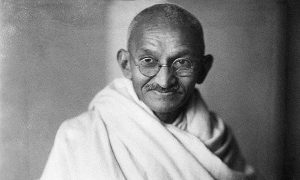
Introduction: Mahatma Gandhi, born Mohandas Karamchand Gandhi on October 2, 1869, in Porbandar, India, was a pivotal figure in the Indian independence movement. Renowned for his philosophy of nonviolent resistance, or satyagraha, he led India to independence from British rule and inspired civil rights movements worldwide.
Bio/Wiki:
| Attribute | Details |
|---|---|
| Full Name | Mohandas Karamchand Gandhi |
| Born | October 2, 1869 |
| Birthplace | Porbandar, India |
| Died | January 30, 1948 |
| Profession | Lawyer, Politician, Social Activist, Writer |
| Known For | Leader of the Indian independence movement, proponent of nonviolent civil disobedience |
| Spouse | Kasturba Gandhi |
| Children | Harilal, Manilal, Ramdas, Devdas |
| Education | University College London (Law) |
| Nationality | Indian |
| Awards | Bharat Ratna (posthumous) |
| Legacy | Father of the Nation in India, global icon for peace and nonviolence |
Reference: Mahatma Gandhi – Britannica
Career Highlights:
| Year | Event |
|---|---|
| 1893 | Led a campaign against racial discrimination in South Africa |
| 1915 | Returned to India and became a leader in the Indian independence movement |
| 1919 | Launched the Non-Cooperation Movement against British rule |
| 1930 | Led the Salt March, a 240-mile protest against British salt taxes |
| 1942 | Initiated the Quit India Movement demanding immediate independence |
| 1947 | India gained independence from British rule |
| 1948 | Assassinated on January 30, 1948 |
Reference: Mahatma Gandhi – Biography
Awards:
| Award | Year | Description |
|---|---|---|
| Bharat Ratna | 1948 | India’s highest civilian award, conferred posthumously |
| International Gandhi Peace Prize | 1995 | Established by the Government of India to honor individuals or institutions for their contributions towards social, economic, and political transformation through non-violence and other Gandhian methods |
| Mahatma Award | 2015 | Honors individuals and organizations for their impactful contributions in various fields, inspired by Mahatma Gandhi’s principles |
References: International Gandhi Peace Prize, Mahatma Award
Personal Life: Gandhi married Kasturba Makhanji at the age of 13. They had four sons: Harilal, Manilal, Ramdas, and Devdas. Gandhi’s personal life was marked by his commitment to simplicity, self-reliance, and adherence to his principles of nonviolence and truth.
Reference: Mahatma Gandhi – Biography
More Details: Mahatma Gandhi’s philosophy of nonviolent resistance has influenced numerous civil rights movements globally. His dedication to truth and nonviolence continues to inspire leaders and activists around the world.
Reference: Mahatma Gandhi – Biography
Popular Search Queries: Mahatma Gandhi biography, Mahatma Gandhi age, Mahatma Gandhi family, Mahatma Gandhi education, Mahatma Gandhi early life, Mahatma Gandhi nonviolent resistance, Mahatma Gandhi Salt March, Mahatma Gandhi Quit India Movement, Mahatma Gandhi assassination, Mahatma Gandhi awards, Mahatma Gandhi Bharat Ratna, Mahatma Gandhi International Gandhi Peace Prize, Mahatma Gandhi Mahatma Award, Mahatma Gandhi personal life, Mahatma Gandhi Kasturba Gandhi, Mahatma Gandhi children, Mahatma Gandhi writings, Mahatma Gandhi autobiography, Mahatma Gandhi philosophy, Mahatma Gandhi influence, Mahatma Gandhi legacy, Mahatma Gandhi quotes, Mahatma Gandhi teachings, Mahatma Gandhi principles, Mahatma Gandhi leadership, Mahatma Gandhi role in Indian independence, Mahatma Gandhi Nobel Peace Prize, Mahatma Gandhi Nobel Prize, Mahatma Gandhi Nobel Peace Prize nomination, Mahatma Gandhi Nobel Peace Prize omission, Mahatma Gandhi Nobel Peace Prize controversy
References:
- Mahatma Gandhi – Britannica
- Mahatma Gandhi – Biography
- International Gandhi Peace Prize
- Mahatma Award



